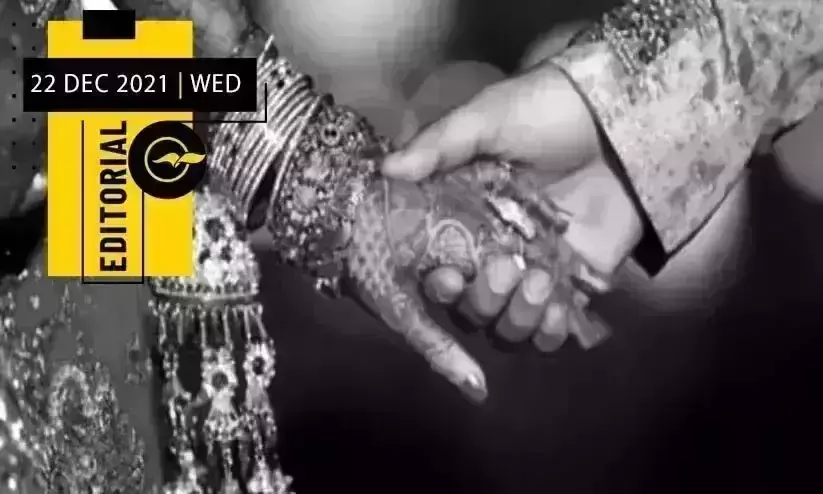
The drama in the name of marriageable age
text_fieldsIt's been a while since the central government has adopted the habit of pursuing its agenda by mocking the Parliament. Bills are passed as though baking bread. The method adopted is to somehow implement the legislation and amendments needed to implement their agenda. However, that method has not been resorted to in the case of this bill to raise the minimum age of marriage for girls from 18 to 21. Instead, it has been referred to the subject committee. The BJP can argue that the Centre has upheld the culture of democracy by accepting the opposition's demand that the bill be left to the subject committee. But it remains to be seen whether that is the case.
In a majority of countries worldwide, the minimum age of marriage for women is 18. The same is true of Western capitalist countries, considered to be at the forefront of women's empowerment. However, raising the minimum age of marriage to 21 has been put forward by the Central Government as a new way of empowering women in India. However, no logical explanation has been put forth for how it empowers women. The Law Commission has not put forward such a proposal. On the other hand, some experts have recommended lowering the age of marriage for men from 21 to 18. Major women's organisations in the country are also opposed to raising the age of marriage to 21. Then why is the central government playing this drama? There are several reasons for the same.
The BJP and the central government think that they can hurt Muslims by raising the age of marriage for women. They think that there will be a lot of opposition from the Muslim community against the amendment and that they could exploit the same. They also reckon that such a communal atmosphere could be used in the forthcoming assembly elections. Thus the design is to shoot at several birds with this one strike. Thereb yplay with communalism on the one hand and image of progressives on the other. If the Opposition opposes the Bill, it can be propagated that it is taking an anti-feminist and reactionary stance on behalf of Muslims. The Central Government has come up with the Child Marriage Prohibition Amendment Act with several objectives in mind.
Why did the Centre not adopt their usual practice of passing the bill at any cost on the age of marriage bill? The fact is that there is no consensus within the Sangh Parivar itself on raising the minimum age of marriage. There are those within the Sangh Parivar who think that raising the age of marriage will have the worst effect on the Hindu community. It is not legally possible to raise the minimum age of marriage for Muslims alone. Hence, they make a fuss about the bill coming and convince the public of their progressive interest by introducing the bill. They propagate that Muslims and the Opposition are causing trouble all over the country. By passing the bill to the select committee, they can also proclaim that they are good democrats. At the same time, by not passing the bill, the dissidents within the Sangh Parivar can be kept together. Thus, the BJP sees the age-related legislation as the best political weapon of all. Unaware of all this, the Opposition is groping in the dark as to what stance to take in the matter.
Opposition MPs were protesting outside the House on the Lakhimpur issue when they received a copy of the bill and knew that the bill was going to be introduced. The main opposition, Congress, could not come to a consensus on what position to take on the issue. They focussed on a single point: leave it to a subject committee. Fear of being stigmatised as anti-progressive prevented them from taking a definite stand and the BJP capitalised on this confusion.























